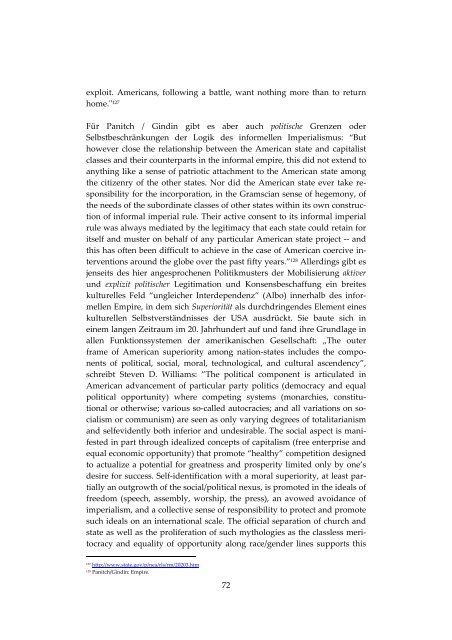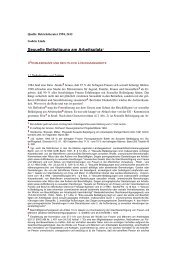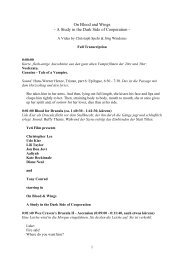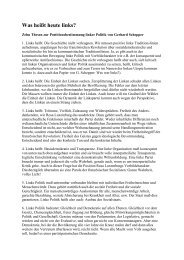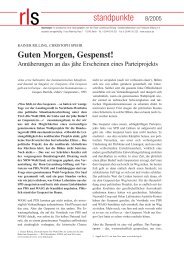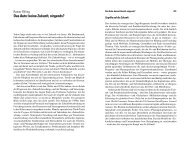outbreak. let's take over. american empire als wille ... - Rainer Rilling
outbreak. let's take over. american empire als wille ... - Rainer Rilling
outbreak. let's take over. american empire als wille ... - Rainer Rilling
Erfolgreiche ePaper selbst erstellen
Machen Sie aus Ihren PDF Publikationen ein blätterbares Flipbook mit unserer einzigartigen Google optimierten e-Paper Software.
exploit. Americans, following a battle, want nothing more than to return<br />
home.ʺ127<br />
Für Panitch / Gindin gibt es aber auch politische Grenzen oder<br />
Selbstbeschränkungen der Logik des informellen Imperialismus: “But<br />
however close the relationship between the American state and capitalist<br />
classes and their counterparts in the informal <strong>empire</strong>, this did not extend to<br />
anything like a sense of patriotic attachment to the American state among<br />
the citizenry of the other states. Nor did the American state ever <strong>take</strong> responsibility<br />
for the incorporation, in the Gramscian sense of hegemony, of<br />
the needs of the subordinate classes of other states within its own construction<br />
of informal imperial rule. Their active consent to its informal imperial<br />
rule was always mediated by the legitimacy that each state could retain for<br />
itself and muster on behalf of any particular American state project -- and<br />
this has often been difficult to achieve in the case of American coercive interventions<br />
around the globe <strong>over</strong> the past fifty years.” 128 Allerdings gibt es<br />
jenseits des hier angesprochenen Politikmusters der Mobilisierung aktiver<br />
und explizit politischer Legitimation und Konsensbeschaffung ein breites<br />
kulturelles Feld “ungleicher Interdependenz” (Albo) innerhalb des informellen<br />
Empire, in dem sich Superiorität <strong>als</strong> durchdringendes Element eines<br />
kulturellen Selbstverständnisses der USA ausdrückt. Sie baute sich in<br />
einem langen Zeitraum im 20. Jahrhundert auf und fand ihre Grundlage in<br />
allen Funktionssystemen der amerikanischen Gesellschaft: „The outer<br />
frame of American superiority among nation-states includes the components<br />
of political, social, moral, technological, and cultural ascendency”,<br />
schreibt Steven D. Williams: ”The political component is articulated in<br />
American advancement of particular party politics (democracy and equal<br />
political opportunity) where competing systems (monarchies, constitutional<br />
or otherwise; various so-called autocracies; and all variations on socialism<br />
or communism) are seen as only varying degrees of totalitarianism<br />
and selfevidently both inferior and undesirable. The social aspect is manifested<br />
in part through idealized concepts of capitalism (free enterprise and<br />
equal economic opportunity) that promote “healthy” competition designed<br />
to actualize a potential for greatness and prosperity limited only by one’s<br />
desire for success. Self-identification with a moral superiority, at least partially<br />
an outgrowth of the social/political nexus, is promoted in the ide<strong>als</strong> of<br />
freedom (speech, assembly, worship, the press), an avowed avoidance of<br />
imperialism, and a collective sense of responsibility to protect and promote<br />
such ide<strong>als</strong> on an international scale. The official separation of church and<br />
state as well as the proliferation of such mythologies as the classless meritocracy<br />
and equality of opportunity along race/gender lines supports this<br />
127<br />
http://www.state.gov/p/nea/rls/rm/20203.htm<br />
128<br />
Panitch/Gindin: Empire.<br />
72


